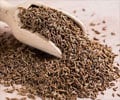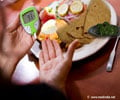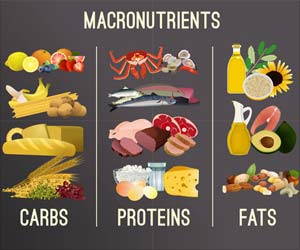The daily vitamin requirement might vary according to the individual's health condition. Consult your doctor for the right amount of vitamins needed for you and stay healthy.
Why do We Need Vitamins?
Vitamins are chemical compounds that are essential for the growth, development and functioning of the cells in the body. They are also necessary for the absorption of nutrients into the body.
Vitamins are naturally found in many foods including fruits, vegetables, legumes, and grains.
Worried about vitamin deficiency?Are you taking too many vitamin pills in a day?The Daily Vitamin Requirement Calculator can calculate your recommended daily intake of the vitamin, its sources, and the symptoms of its deficiency.
A few commonly used measuring units in this calculator are (
1✔):
mg – milligram
mcg – microgram
IU – international unit
What Vitamins Do We Need Daily?
We cannot synthesize vitamins or minerals and we need to rely on foods and food supplements for our everyday needs.There are thirteen essential vitamins, and they are divided into two categories, water-soluble and fat-soluble vitamins.The water-soluble ones include
vitamin C and the B group of vitamins. These are not stored by the body and are easily depleted (
2✔). The fat-soluble vitamins A, D, and E remain in the body for longer periods of time (
3✔).
The recommended daily vitamins are:
Vitamin deficiency may result from a lack of vitamin intake. Hence, it is necessary to have a proper diet routine with balanced nutrients on a daily basis.
Both deficiency or overdose of vitamins can harm you (
4✔).
Advertisement
Learn about Dietary Reference Intakes
Recommended Dietary Allowances for vitamins and minerals have been published since 1941 by the National Academy of Sciences (
5✔).
Dietary Reference Intakes (DRIs)
DRIs are reference values that are quantitative estimates of the nutrient intake, which is useful in planning and assessing diets for healthy people. If you take more nutrients than required, it can adversely affect you, and if you take less, it may not meet your requirements to maintain good health.
Recommended Dietary Allowance (RDA)
RDA is defined as the average daily dietary intake level that is sufficient to meet the nutrient requirement of nearly all (97 to 98 percent of the population) healthy individuals in a group.
Adequate Intake (AI) Tolerable Upper Intake Level (UL)
UL is the highest level of daily nutrient intake that is likely to pose no risk of adverse health effects to almost all individuals in the general population. If the intake increases beyond the UL, the risk of adverse effects increases.
Estimated Average Requirement (EAR)
EAR is the nutrient intake value that is estimated to meet the requirements of half the healthy individuals in a group.
A Few Interesting Facts about Vitamins
- Vitamin A is derived from carotenes present in various foods and alpha-carotenes are the richest sources of vitamin A.
- The fat-soluble vitamins, A, D, E, & K, can be stored in the body fat and utilized for the body’s metabolism as and when required.
- The water-soluble vitamins, B & C, cannot be stored in the body for too long, and any excess is excreted in the urine, thus necessitating the regular intake of these vitamins (2✔).
- Smoking just one cigarette can destroy the equivalent amount of vitamin C contained in one orange (7✔).
- High doses of vitamin B6, which is used to combat premenstrual tension, can cause nerve damage (8✔).
- An over dose of vitamin A during pregnancy can harm the unborn child.
- Did you know that food fortification and infant formula supplementation with high levels of vitamins, has led to a sharp increase in the prevalence of obesity and related diseases (9✔).
Frequently Asked Questions
1. Is it good to take a multivitamin every day?
If you find it challenging to get the recommended amount of vitamins in your daily diet, taking one multivitamin per day can help you maintain a healthy lifestyle (10✔).
2. What are the vitamins required for a woman during pregnancy?
All vitamins and minerals are important and should be taken through a healthy, balanced diet of different types of food.
The following list of vitamins contains the most essential vitamins for women during pregnancy:
3. Can dietary supplements be harmful?
Dietary supplements are mostly safe, but certain supplements can raise your risk for new health problems, especially if you are also taking other medicines. It would be best if you always talked to your doctor or nurse before taking a dietary supplement (11✔).
Recommended Readings on Daily Vitamin Requirement
Chronic dieting is associated with eating disorders that mainly include unhealthy eating practices such as severe calorie restriction in diet of men or women who on a regular basis follow fad diets mainly to reduce weight.
Vitamin A is an extremely vital vitamin needed for the eyes, skin, hair, immunity and during pregnancy. Lack of vitamin A can lead to night blindness.
Deficiency of vitamin B12 can result in hematological, neurological and psychological complications which are life-threatening.
Start eating Vitamin E rich foods such as nuts and oilseeds, whole grains and green leafy vegetables and you can bid goodbye to most of your hair, eye and skin problems.
Multivitamins are commonly taken by several healthy people, which may make you wonder if you need them. The following quiz will help you get a clearer view of the necessity and benefits of ...
Vitamins are essential for our body to grow and develop normally. Vitamin deficiencies are widespread. Understand the role of dietary sources in vitamin deficiency prevention.
Cumin seeds are used in numerous dishes in a variety of cuisines across the world. Find out how you can reap the health benefits of cumin seeds.
This is a quick calculator to find out how much iron is needed for babies, girls, boys, men, women, pregnant and breast feeding women. The Intake Calculator also includes iron rich foods.
Many people take a daily dose of vitamins, believing in their magical properties. But, what science has to say is something completely different!
Vitamin D is an essential vitamin necessary for the development of bones. Sunlight helps the body to produce vitamin D. Vitamin D deficiency results in rickets in children and osteomalacia in adults.
With increasing health awareness, a lot of people are making sure that they eat nutritious food. A well-balanced diet is not only important for growing children, it is equally important for the middle-aged group as well as the elderly. But are your ...
Effective nutrition education in schools can eventually force children to rethink about their eating habits and form their own new ones.
Everyone requires good nutrition, be it man, woman, child or elderly. However, nutrition that men need differs slightly from that required by women. Find out how ...
Easy to understand info & tips with diagrams about vitamin supplements like vitamin C, B6, B9 & B12. Latest research news on each vitamin's benefits and drawbacks for better consumer understanding.
Certain natural foods have unique ingredients that can enhance the health of people living with diabetes. Learn about them through this slideshow.
The height and weight calculator is a useful tool to ascertain the ideal height and weight of the children according to age and gender.
Calculate the ideal body weight for adults easily with Medindia's Ideal Body Weight Calculator.
Calculate the ideal weight of your baby with Medindia's Infant weight calculator.



























